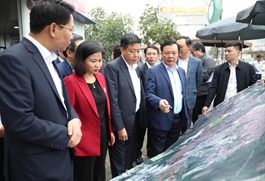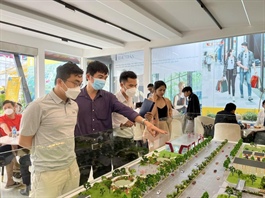Together for a long-term partnership
Together for a long-term partnership
Despite market swings, foreign investment capital continued to flood heavily into several categories of Vietnamese real estate in 2022. Mergers and acquisitions (M&As) in the real estate industry have been particularly attractive due to the existence of a number of loaded giants.
“The most alluring aspect of Vietnamese real estate is its potential for expansion. In 2011, when we began our studies, the number of apartments in Ho Chi Minh City was fewer than 10,000, but by 2018, it had risen to more than 40,000, indicating that the market’s growth potential is still considerable,” said Oh Dong Kun, general director of Tokyu Corporation in Vietnam.
For instance, following a series of real estate developments in Binh Duong province together with Japan’s Becamex IDC, Tokyu Corporation recently announced the formation of a joint venture with Danh Khoi Group to execute resort construction in Ba Ria-Vung Tau province.
In addition, CapitaLand Development, Singapore’s real estate development subsidiary, bought an 8-hectare land bank in Thu Duc city in mid-July. The company intends to construct a complex with more than 1,100 apartments and shophouses. The project will be started in 2024 and aims to be complete in 2027.
Previously, Gaw Capital Partners, a Hong Kong-based private investment firm, funded a data centre project in Saigon Hi-Tech Park. In addition, June saw an M&A transaction involving a housing project in Thong Nhat district of Dong Nai province and the sale and acquisition of initial project land in Thu Duc city.
Su Ngoc Khuong, senior director at Savills Vietnam, commented on the M&A trend of foreign investors in Vietnam’s real estate market, stating that this is an excellent chance for local companies. The interconnection of financial resources assists businesses in enhancing their ability to build initiatives and attract new consumer sources provided by overseas investors.
“In addition, this will aid listed firms in obtaining international investments on the stock market. Small businesses with limited financial resources must have a plan to reorganise their investment portfolio in order to assure the completion of the project’s legal processes,” Khuong said.
Neil MacGregor, managing director of Savills Vietnam, furthers this approach by stating that it is feasible to get funds from international investors for the real estate business due to the high awareness in the Vietnamese market. “Businesses should be adaptable and aggressive in their pursuit of alternate finance sources. With clean land funds, clear working procedures, and adequate investor capacity, it is not impossible for enterprises to attract appropriate investors,” he said.
With the advantages of understanding the market and administrative procedures of domestic businesses, combined with the experience and financial capacity of foreign investors, numerous large-scale, high-quality real estate projects have been supplied to the market in each and every segment, according to MacGregor.
Long-haul collaboration
Monthly reports from the Foreign Investment Agency under the Ministry of Planning and Investment reveal that as of November 20, the total foreign capital freshly registered, adjusted, and contributed to acquire shares surpassed $25.1 billion, representing a 95 per cent increase over the same time in 2021. The real estate sector came in second with more than $4.2 billion, accounting for roughly 16.7 per cent of the total registered investment capital, a 75 per cent increase over the same period in 2021.
The increasing interest of international partners and the growth of private investment funds have created a new channel for Vietnamese real estate businesses to raise capital, in light of the fact that local channels such as credit, corporate bonds, and the stock market are experiencing challenges.
However, there are still several legal obstacles preventing foreign investors from entering Vietnam’s real estate sector. In addition, not every project or developer can attract foreign finance; international investors can only target reputable projects, transparent developers, and clean land funds.
Economist Dinh The Hien concurs, stating that forming partnerships with international companies that have a strong brand and a history of project development would enable domestic real estate groups to construct larger projects with more resources. “In addition to financial difficulties and collaboration with overseas partners, local real estate groups get assistance in the areas of expertise and technology,” Hien said.
However, for a successful and long-lasting partnership, the parties must be open and transparent for mutual benefit. Only when advantages are shared fairly and openly will the cooperative partnership be sustainable.
Regarding the difficulty of assuring capital, Hien said that real estate developers need a solution for the sustainable mobilisation of money. Specifically, it is required to limit the demand for bank loan capital, particularly for non-priority projects, and the output is selective with regard to clients. Simultaneously, equity capital must be enhanced to boost
resources, since real estate firms demand equity-based financial strength, particularly when completing significant projects.
“To jointly develop the project, it is also required to collaborate with financial organisations, such as real estate investment trusts or international partners. In addition, developers must know how to handle risks, since there will be hazards associated with interest rates, currency rates, and financing this year and next,” Hien said. “In addition, they must enhance their own openness and professionalism, particularly their credit records, securities issuance records, and commitment fulfilment.”





















